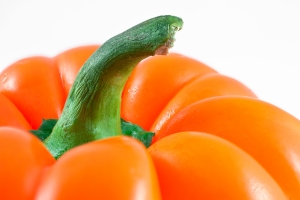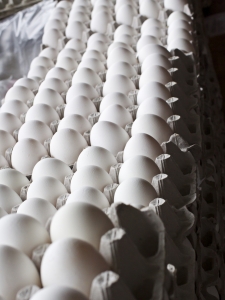Every produce we buy, every bite we take, we are negotiating our identities with our food, establishing who we are based on how we shop for food. Now, while food isn’t the center of our identities, it does certainly say something about who we are as a culture and individuals. Commonly, the discussion we are having with our food is political. (E.g., taxpayers elect government officials who, in an act to stimulate the economy, will give a portion of that tax collection to businesses in subsidies for growing or making certain products, like ethanol, which allows the company to sell their product at a cheaper price, and allows consumers—which is usually synonymous with taxpayer—to buy more.) But within this political discussion, there is also gender identities being discussed as well.
Just think about it for a second. Are there certain foods that you innately associate as particularly masculine or feminine? Right off the bat, I could probably say that BBQ, spicy foods, hotdogs, hamburgers, and other animal-based foods are socially constructed as masculine, while salads, fruit, vegetables, and plant-based foods as constructed as feminine. This isn’t to say that men only eat meat and women only eat plants, and vice versa, but rather that we collectively engage in a cultural exchange of meaning in interpolating men with meat and women with plants.
This, of course, might even be an instinctual quality of humanity, and even life if we consider what meat and plants represent. You see, meat is tough and rugged with gristle and fat, but, at the same time, extremely sensitive—it’s a common misconception that animals don’t feel anything. And so, I can easily imagine a cow as being sad that it’s about to die and crying about it, in its own way, just like men would. But once the animal is dead, again just like men, they’re complacent, quiet, and easy to manipulate.
Also, for some reason, men are often associated with action and conflict, either in the form of war, fighting, engaging in dangerous activities or professions, etc. etc. Essentially, this is bundled into the idea of an “animal instinct”—which then it makes kind of self-explanatory why animal-based foods would be considered primarily masculine.
Then consider how meat is produced and the process it must go through before it reaches our supermarkets and inevitably our plates. It’s a brutal process that is intertwined with this sense of masculinity for quite some time. The process by which we raise, nurture, and then kill animals for food is often times overlooked because, well, it’s just easier not to think about it. And that seems like a very manly thing to do. Rather than address some of the issues involved in the process of making and eating animal-based foods, we brush it off and move on to the next thing.
Plants and women, on the other hand, are nurturing, loving, and everything sweet. Alright, maybe not in reality, but again, we’re dealing with perceptions and not the way things actually are. But it makes you wonder: What is it about plants that we associate them with the feminine? Is it because they seem so organic? Or perhaps it’s their docility? Or maybe it’s the absolute necessity of plants that make them feminine?
All the nutrients we need, including protein and calcium, can be provided by plants. In fact, there’s absolutely no necessity in eating animals, though I’m not advertising for neither a vegetarian mentality nor a vegan one either. But it’s a scientific fact that animals are not necessary food sources, but rather we’ve come to accept them as such. This is similar to the mentality we have about women. They’re paid less than men, they’re still subjected to patriarchal policies to govern their bodies, and overall are subjugated in a role of the lesser within society because of this patriarchal delusion that men do things better than women. It’s a logical falsity that was somehow able to be perpetuated for thousands of years. And it relates directly to how we few vegetables. While we see them as a necessary chain within the food pyramid, plant-based foods are often marginalized when compared to meat and animal-based food, primarily because we’ve falsely perpetuated this idea that meat is somehow superior and even healthy for us. But it’s not. Eating meat, like patriarchy, is not necessarily a healthy process.
 For a thought experiment, think of plants and animals in their daily interaction without any human interference. They’re able to symbiotically coexist. Animals realize the importance of plants and respect a certain boundary by not destroying plant-based habitats, while plants provide sustenance for animals so that they can continue to live. Mankind, though, has somehow been able to implement a series of societal hegemony that has vastly subverted any natural survival tendencies because of institutional patriarchy telling us to dominate, conquer, and ultimately destroy.
For a thought experiment, think of plants and animals in their daily interaction without any human interference. They’re able to symbiotically coexist. Animals realize the importance of plants and respect a certain boundary by not destroying plant-based habitats, while plants provide sustenance for animals so that they can continue to live. Mankind, though, has somehow been able to implement a series of societal hegemony that has vastly subverted any natural survival tendencies because of institutional patriarchy telling us to dominate, conquer, and ultimately destroy.
Invariably, the association of food and gender comes down to the question of dominance. Men must perceptively dominate their food, and it’s simply not considered masculine to dominate docile creature such as plants. But rather, ever since the hunting-and-gathering era of society, man has been delineated to the role of conquering other animals, other beasts of prey.
Women, though, because of their lack of association of dominance, have been subjected to the delegated the role of subservience, just as we see plant-based foods as lesser and subservient to their animal-based counterpart.
I believe when we realize the equal capacity for both animal- and plant-based foods that it will be the canary in the coalmine telling us gender equality is spreading. Until that day, though, we will continue to delineate valuation in qualitative measures to pit a certain type of food with a particular gender, and thus detract from the overall importance of what we put into our bodies.





